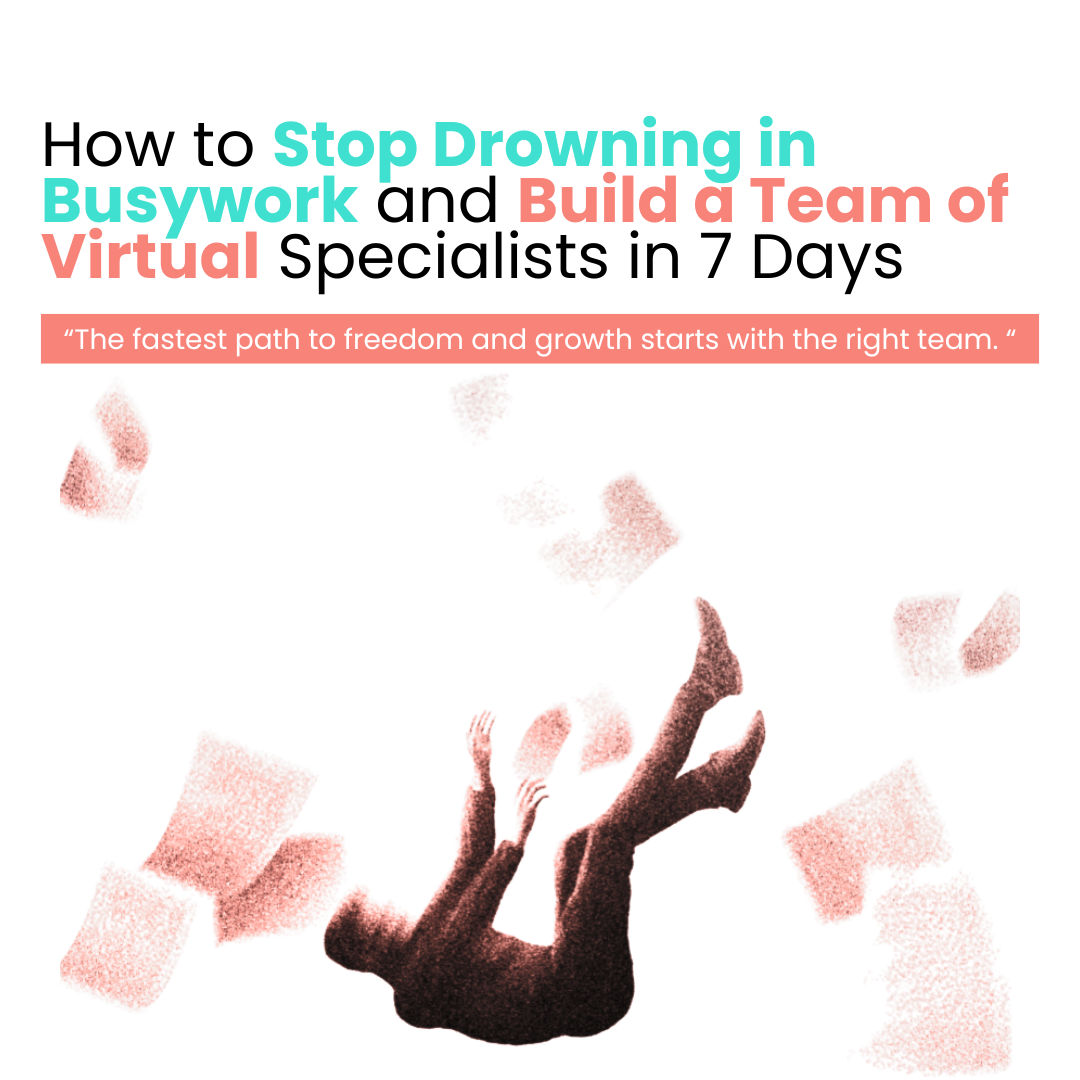The Reality and Risks of Using AI for Content Creation: Facts!
With the advent of artificial intelligence (AI), creatives can now take advantage of its technology to create content to improve their digital marketing efforts— especially since digital content such as videos, graphics, infographics, and blog content are what’s overtaking the sphere now. However, along with the sterling benefits of AI comes the reality that the content made from it is not entirely original or unique. That is why, in this blog post, we’ll explore the risks in content creation that come along with the glory that is AI and the repercussions they impose.
Related Article: Why Content Marketing Matters? Best Techniques
STOP MANAGING TASKS. START LEADING.
SMART Delegation helps you reclaim your role as CEO while building a stronger team.
What is AI-Generated Content?
Artificial Intelligence can be a lot of things: it can help calculate different equations, it can be a virtual assistant like Siri, and it can even be a robot that can help you with your house chores. With this in mind, it is important that we first understand how AI can be integrated into digital marketing and what are the different kinds of AI-generated content.
AI-generated content can be in the form of images, text, audio, or videos, which are created by artificial intelligence programs. AI utilizes machine learning algorithms, deep learning techniques, and natural language processing when creating these kinds of content in order to mimic how humans create content.
To be specific, AI can generate product descriptions for you, write SEO-optimized blog posts, produce art, and even go as far as composing music. To put everything into context, the main purpose of the creation of AI-generated content is to save time, increase efficiency, reduce human effort, and, ultimately, streamline content production.
The Reality of AI in Content Creation
There is no question that the emergence of AI in the digital marketing landscape has been deemed to be really significant. Whether we agree to the utilization of AI or not, we cannot deny that, in reality, it really does help creators in so many ways. Below are the main areas where you can benefit from the use of AI in content creation.
1. Efficiency and Productivity
It is not AI-generated content if it does not help you improve your efficiency and productivity. As it’s expected to work, AI can generate content at a much faster pace than humans. Thus, it is a valuable tool if you are someone who is pressed with deadlines or if you are overwhelmed at creating content manually. Apart from generating images or other creative aspects, AI can also be helpful in automating repetitive tasks such as data entry, market research, data analysis, and producing initial drafts.
Related Article: What is a Data Entry Virtual Assistant and How to Hire Them
2. Cost Savings
Because of how AI works, its machine learning algorithm, and deep learning processes, it makes creating content as simple as drawing a circle. And, of course, the time used to create something is correlated with the cost, meaning, the higher the time spent, the higher the cost. Furthermore, hiring designers, editors, and writers can be really expensive since you are paying them for their skills and expertise. This is where AI can be a great alternative, especially if you are someone who is not so particular about the kind of content AI produces.
3. Quality Improvement
Believe it or not, AI does produce content of increasingly high quality. It has drastically evolved, wherein it can already generate grammatically correct, relevant, and well-structured pieces. Moreover, it can even proofread articles, fix writing errors, and essentially just improve the overall quality of the content.
4. Multilingual Content
If your business is trying to reach places that do not speak your specific language or are aiming to infiltrate the global market, AI can be a very helpful tool in translating your content. Its ability to translate texts into multiple languages can make you reach non-English speaking customers without dropping a sweat.
5. Customization and Personalization
One of the best features and innovations of AI today is you can already instruct it to customize and personalize your desired content according to the preferences and persona of your target audience. For instance, you can tailor the products you can show your potential customer based on their purchasing behavior or browsing history.
The Risks of AI-Generated Content
Of course, there will always be room for improvement in every innovation. Artificial intelligence, just like any other kind of technology, as much as it offers numerous benefits, also has its limitations and can sometimes pose risks and challenges. In relation, it is important that if you decide to utilize AI, you are aware of these risks. Below are some:
1. Quality and Originality Concerns
Although AI can easily produce high-quality content at a very fast speed, there is still a huge gap between its generated content and the ones produced by humans. Yes, AI can surely replicate or create content, but it is normally referenced to already existing content, making it unoriginal. Unlike human-generated content, it cannot fully incorporate nuances that are very important if you want your content to resonate with your audience. If you just use AI with all your content, it might come off as robotic, and won’t be able to connect with your audience on a personal level.
2. Ethical Considerations
AI-generated content raises ethical questions about transparency. Readers and consumers may not always be aware that they are interacting with AI-generated content. This lack of transparency can undermine trust and authenticity in content.
Moreover, content produced by AI systems can lack the ethical judgment and empathy that human writers bring to their work. This can lead to the dissemination of biased or inappropriate content. That is why it's crucial for organizations to be clear about their use of AI in content creation and provide proper attribution when necessary.
3. Loss of Human Jobs
One of the most pressing concerns surrounding AI-generated content is its potential impact on employment. The fear is that as AI becomes more capable of producing content, it could replace human writers and content creators, leading to job loss in the industry. This issue is complicated and warrants careful consideration of the future of work in the digital age.
4. Copyright and Plagiarism Issues
AI systems often rely on large databases of text to generate content. In some cases, this can lead to issues with plagiarism and copyright infringement. If an AI system unintentionally generates content that closely resembles existing material, it could result in legal troubles or damage to a brand's reputation.
5. Protecting Your Business
Given these risks, it’s wise to consider a formal business structure that helps limit personal liability. Choosing an option like an LLC can help protect personal assets from business liabilities, including legal claims related to copyright infringement or other issues arising from AI-generated content. However, the benefits of forming an LLC can vary by state. For example, forming an LLC in California has additional laws such as the CCPA impose strict rules on data usage and privacy, making a solid legal structure even more important for businesses working with AI and large datasets.
6. Security Risks
AI-generated content can be manipulated for malicious purposes, such as creating deepfake videos or spreading disinformation. This poses significant security risks, both on a personal and societal level.
Conclusion
Smart Virtual Assistant
👍🤵
Smart Virtual Assistant 👍🤵
AI-generated content is an increasingly prevalent and influential force in the content creation industry. While it offers numerous advantages, such as efficiency, cost savings, and improved quality, it also comes with its fair share of risks, including concerns about quality, plagiarism, ethics, job displacement, and control. Content creators should approach AI as a valuable tool that can complement their work rather than a replacement.
As AI technology continues to evolve, content creators should know how important it is to strike a balance by understanding the potential risks and opportunities of AI while maintaining authenticity and creativity. At the end of the day, whether you're exploring the power of AI-generated content or prefer a human touch, SMART VAs is here to help you achieve your content goals. Our team of skilled content creators is ready to support your journey. If you need assistance, guidance, or a blend of both, don't hesitate to contact us. Let's bring your vision to life together!
What if you could reclaim 40 hours this month?
Find out inside this free guide.
Frequently Asked Questions
-
AI can be a threat to content writers to a certain extent. Indeed, it can help writers generate ideas, making it faster to write. However, using AI solely to write content can be disadvantageous as it cannot empathize with its readers. AI is best used to supplement human-created content, but always cross-check its output for accuracy and relevance.
-
AI can be used in several kinds of content, such as blogs, newsletters, social media copies, product descriptions, translations, data analysis, and even automated chatbot responses. It can assist in various stages of content creation, from ideation to optimization.
-
Yes, AI can produce content efficiently, but it cannot fully replace human creators. While it excels at speed and data processing, it lacks empathy, originality, and cultural understanding, which are essential for engaging, high-quality content.
-
The amount of time and money AI can save varies depending on the content type and tasks automated. For example, a blog post that normally takes six hours (including research, SEO, and revisions) could be reduced to four hours with AI assistance. However, over-reliance on AI may compromise content quality, so a balanced approach is recommended.
-
Relying too heavily on AI-generated content can pose several risks:
Quality and Originality Issues: AI content may lack originality and sound robotic.
Plagiarism Concerns: AI may unintentionally reproduce existing content.
Ethical and Transparency Challenges: Audiences may not know content is AI-generated.
Security Risks: Malicious actors could misuse AI to create disinformation or deepfakes.
Being aware of these risks helps you use AI responsibly while maintaining authentic, high-quality content.
Ready to Work Smarter, Not Harder?
Smart VAs provides a team of highly skilled specialists from around the world, ensuring seamless support no matter the time zone. We take pride in delivering efficient, fast, and high-quality service so you can focus on growing your business. With one subscription plan, you gain access to a complete team of digital marketing experts that’s customized to your unique needs, eliminating the need to train and look for one yourself!







